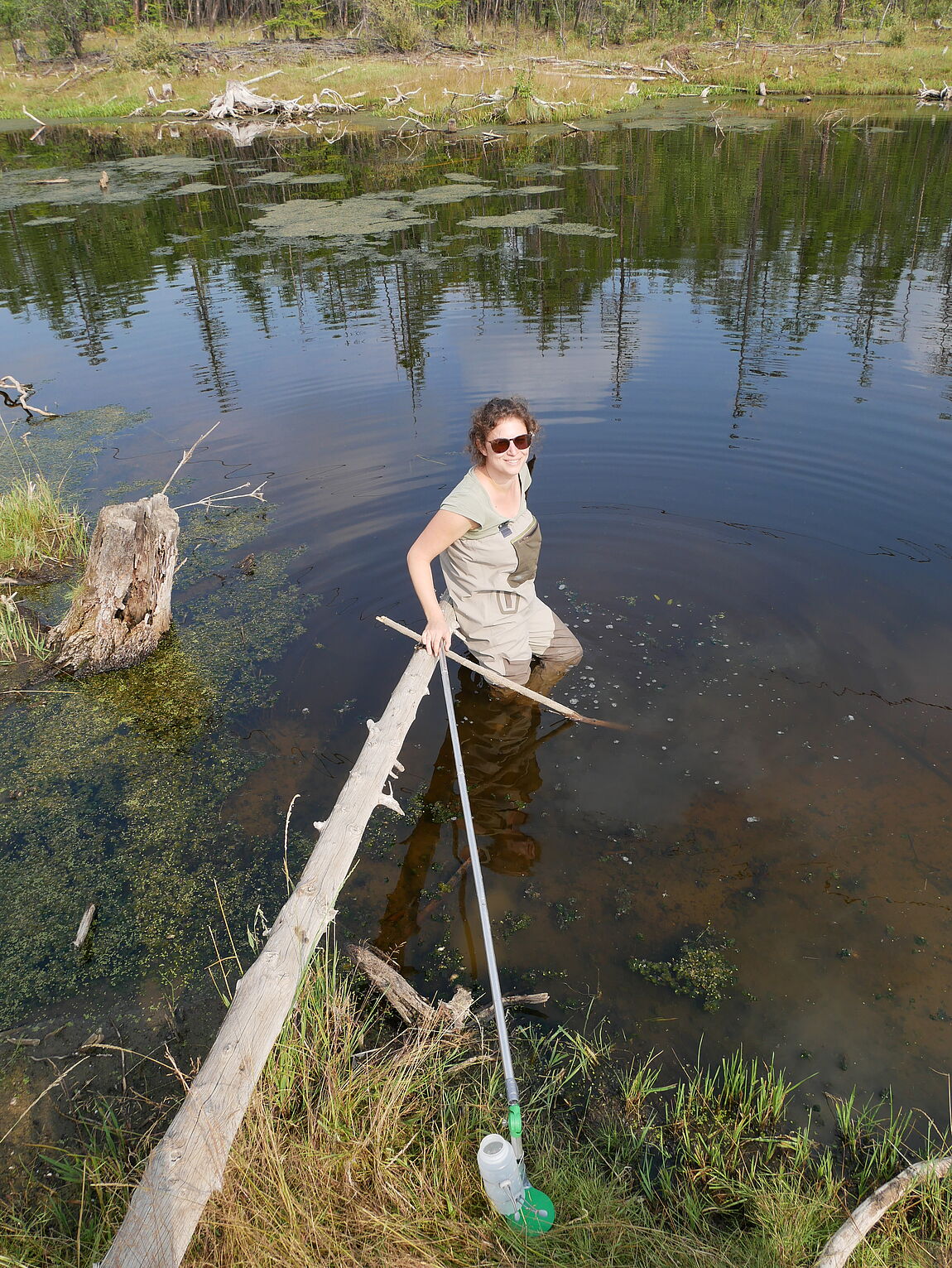Maître de Conférence

ENGEES - Ecole nationale du génie de l'eau et de l'environnement de Strasbourg Bureau 245 | Laboratoire image ville environnement Bureau 310
|

ENGEES - Ecole nationale du génie de l'eau et de l'environnement de Strasbourg Bureau 245 | Laboratoire image ville environnement Bureau 310
|
Ecologie microbienne ; Hyphomycètes aquatiques ; Décomposition ; Pressions anthropiques ; Stress multiples
Depuis Septembre 2024 : MCF à l'Ecole Nationale du Génie de l'Eau et de l'Environnement de Strasbourg (ENGEES) [Ministère de l'Agriculture, de l'Agroalimentaire et de la Forêt (MAAF)]. Rattachée au Laboratoire Image Ville Environnement de Strasbourg (LIVE) - CNRS UMR 7362
2021-2024 : Post-Doctorat, IGB Berlin
2017-2020 : Doctorat en écologie microbienne, Université Paris-Saclay
Enseignements dispensés à l'ENGEES (licence professionnelle, cycle d’ingénieurs)
Bio-statistiques (R) - Géomorphologie fluviale - Transport solide - Chimie des Eaux - Hydroécologie - Recherche bibliographique - Débats en écologie contemporaine - initiation aux SIGs
Enseignements dispensés à l'Université Paris-Saclay (2017-2020)
Bilan radiatif - Bio-statistiques - Hydrologie - Indices biotiques
Supervision
Stagiaires
2017-2020 : Doctorante dans l’équipe « Diversité, Écologie et Évolution Microbiennes » du laboratoire « Écologie, Systématique et Évolution », Université Paris-Saclay, Orsay, France
2015-2016 : Master 2 de Géographie Environnementale cohabilité avec l’École Nationale du Génie de l’Eau et de l’Environnement de Strasbourg, Faculté de Géographie et d’Aménagement, Strasbourg, France (Troisième année de formation d’ingénieur)
2013-2016 : Première et deuxième année de formation d’ingénieur, admission via le concours G2E, École Nationale du Génie de l’Eau et de l’Environnement de Strasbourg, Strasbourg, France
2011-2013 : Première et deuxième année de classe préparatoire Biologie, Chimie, Physique, Sciences de la Terre, Lycée Châteaubriand, Rennes, France
2025
Boden, L., Bludau, D., Sieber, G., Deep, A., Baikova, D., David, G.M., Una Hadžiomerović; Tom L. Stach; Dominik Buchner & Boenigk, J. "Varying Responses to Heat Stress and Salinization Between Benthic and Pelagic Riverine Microbial Communities". Environmental Microbiology, 27(9), e70173. https://doi.org/10.1111/1462-2920.70173
2024
Bouderka, F., López García, P., Deschamps, P., Krupovic, M., Gutiérrez Preciado, A., Ciobanu, M., Bertolino, P., David G.M., Moreira, D., Jardillier, L. “Culture and genome based
characterization of a tripartite interaction between patescibacterial epibionts, methylotrophic proteobacteria, and a jumbo phage in freshwater ecosystems”. bioRxiv, 2024.
https://doi.org/10.1101/2024.03.08.584096
Kaijser, W., Lorenz, A. W., Brauer, V. S., Burfeid-Castellanos, A., David, G. M., Nuy, J. K., Baikova, D., Beszteri, B., Gillmann, S.M., Kiesel J., Mayombo, N.A.S. , Peters, K., Rettig, K., Rolauffs, P., Haase, P. & Hering, D. (2024). Differential associations of five riverine organism groups with multiple stressors. Science of The Total Environment, 934, 173105. https://doi.org/10.1016/j.scitotenv.2024.173105
David G.M., Madge Pimentel I., Rehsen P.M., Vermiert A-M., Leese F., Gessner M.O. (2024) “Multiple stressors in urban streams: A test of salinization, temperature, and flow effects on microbial decomposers and litter decomposition in an outdoor mesocosm experiment”, Science of the Total Environment, 173669. https://doi.org/10.1016/j.scitotenv.2024.173669
Madariaga G., Ferreira V., Arora, R., Mansour, I., David G.M., Jähnig S., He F. (2024) “Multiple-stressor effects on leaf litter decomposition in freshwater ecosystems: A meta-analysis.”,Functional Ecology, 00, 1–14. https://doi.org/10.1111/1365-2435.14571
Madge Pimentel I., Baikova D., Beisser D., Buchner D., Burfeid Castellanos A., David G.M., Deep A., Doliwa A., Dunthorn M., Hadziomerovic U., Leese F, Mayombo S.N.A, Piggott J.J., Prati S., Spyra M.A., Sures B., Tiegs S., Vermiert A-M., Beermann A.J. (2024) “Assessing the response of an urban stream ecosystem to salinization under different flow regimes” Science of the Total Environment, 926, 171849. https://doi.org/10.1016/j.scitotenv.2024.171849
2023
Vos, M., Hering, D., Gessner, M.O., Leese, F., Schäfer, R.B., Tollrian, R., [...], David, G.M., [...], Sures, B. “The Asymmetric Response Concept explains ecological consequences of multiple stressor exposure and release”. Science of The Science of The Total Environment, 2023. https://doi.org/10.1016/j.scitotenv.2023.162196
2021
David G.M., López-García P., Moreira D., Alric B., Deschamps P., Bertolino P., Restoux G., Rochelle- Newall E., Thébault E., Simon M., Jardillier L. (2021) “Small freshwater ecosystems with dissimilar microbial communities exhibit similar temporal patterns”. Molecular Ecology, 30, 2162-2177.https://doi.org/10.1111/mec.15864
Olvera-Vazquez S.G., Remoué C., Venon A, [...], David G.M., [...], Jardillier L., Deschamps P., Jousselin E., Cornille, A. “Large-scale geographic survey provides insights into the colonization history of a major aphid pest on its cultivated apple host in Europe, North America and North Africa”. Peer Community in Evolutionary Biology, 2021. https://doi.org/10.1101/2020.12.11.421644
2020
David G.M., Moreira D., Reboul G., Annenkova N.V., Galindo L.J., Bertolino P., López-Archilla A.I., Jardillier L., López-García P. “Environmental drivers of plankton protist communities along latitudinal and vertical gradients in the oldest and deepest freshwater lake”. Environmental Microbiology, 2020. https://doi.org/10.1111/1462-2920.15346
2017
David G.M., Staentzel C., Schlumberger O., Perrot-Minnot M-J., Beisel J-N., Hardion L. (2017) “A minimalist macroparasite diversity in the round goby of the Upper Rhine reduced to an exotic acanthocephalan lineage”. Parasitology, 145, 1020-1026. https://doi.org/10.1017/S0031182017002177